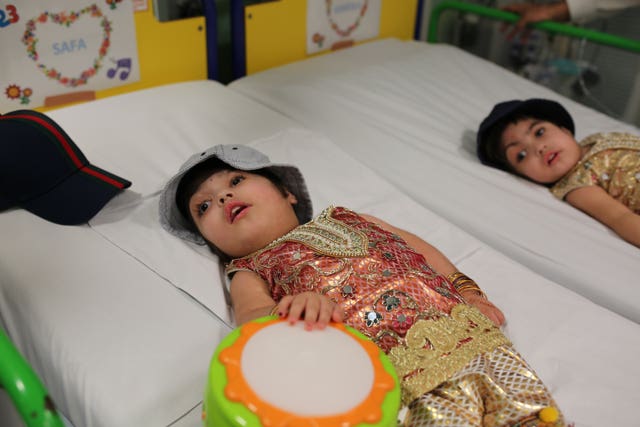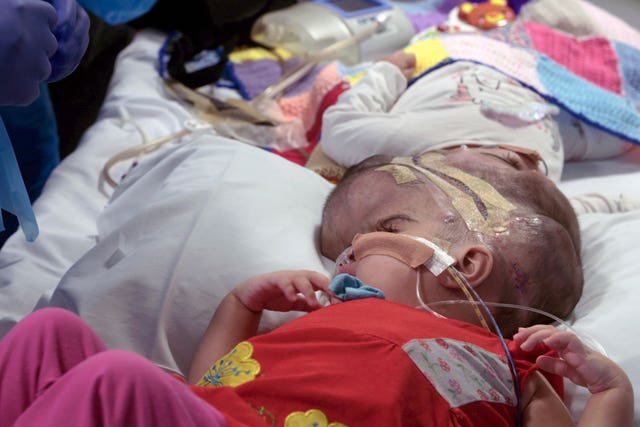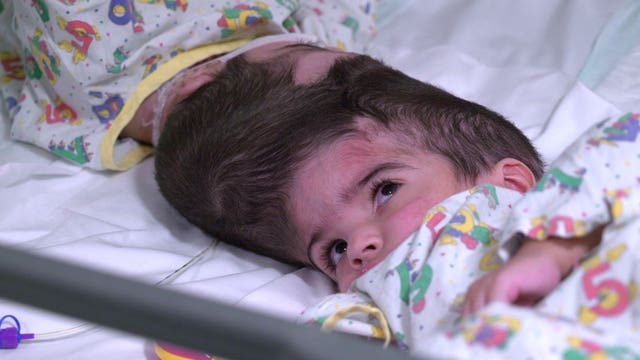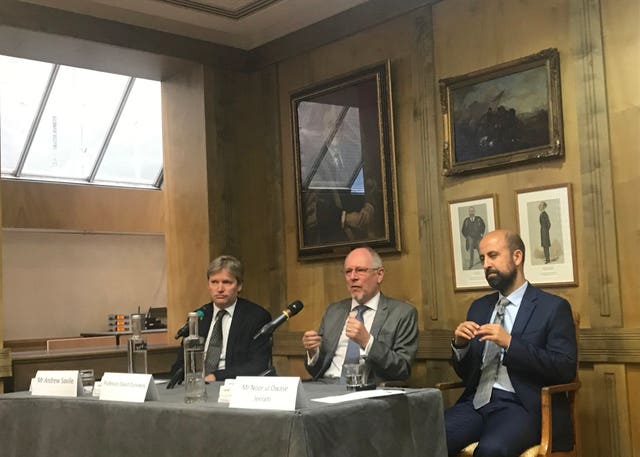Conjoined twins op success will ‘restore UK reputation amid Brexit divisions’
Paediatric neurosurgeon Noor ul Owase Jeelani was involved in separating two-year-old craniopagus sisters Safa and Marwa Ullah from Pakistan.

The successful separation of conjoined twins by a UK team will help restore the country’s global reputation as divisions over Brexit prevail, one of the surgeons has said.
A team at Great Ormond Street Hospital (GOSH) separated two-year-old craniopagus sisters Safa and Marwa Ullah, from Charsadda in Pakistan, whose skulls and blood vessels were fused together.
GOSH has previously successfully separated rare craniopagus twins in 2006 and 2011, making the series of operations the largest in the world.
The team is hoping to make a decision on a fourth set of twins from Europe within the next couple of months.
Paediatric neurosurgeon Noor ul Owase Jeelani, one of the surgeons behind the operations, said they had a “moral responsibility” to help the 50 sets of twins estimated to be born with the condition each year globally.
He told PA: “I think it’s essential. Fundamentally this is what binds us, the humanity, it’s what it’s been like for thousands of years and will carry on, I hope, for thousands of years, so the divisions we are seeing at the moment, in my mind are a temporary phase – divisions come, divisions break down, borders are put up, borders are pulled down, but the reality is you will always hopefully feel for a child in need, you will always hopefully share in a child who’s happy, that’s an ubiquitous human nature and I don’t think that changes.
“So for me, and I speak for the whole team at Great Ormond Street, if there is a child anywhere on the planet that needs our help, our heart will go out and say how do we make this happen.

Mr Jeelani, along with craniofacial surgeon Professor David Dunaway, who also operated on the girls, is launching a charity called Gemini Untwined, which will raise funds to carry out research to help craniopagus twins around the world.
Survival rates for such children beyond infancy is low, with many dying before the age of 10.

Mr Jeelani said the sisters are demonstrating a “quite remarkable recovery on a daily basis” and, while it is too early to be certain, medics remain optimistic that they will go on to lead “fulfilling, independent lives”.
Asked if the success goes some way to restoring Britain’s reputation in a climate paralysed by Brexit, he said: “Absolutely. This is key, at a time where we are being browbeaten over a whole lot of things, what David said, and it’s absolutely key, one of the real strengths of the NHS is it’s set up in a way there aren’t incentives for us to be combative with each other.
“The NHS is not set up in a way where my success can only happen if another surgeon doesn’t do well.
“The NHS, the way it’s set up, it’s a socialist system, it’s much more collaborative, so we are able to grow teams, we are able to get 100-plus people together and say ‘Right, let’s think about this’, and everybody’s just thinking about the real things they need to think about rather than the other pressures that some other countries may have. So this is a key strength of the NHS, the teamwork we grow here.”

While they were dismayed by a large amount of blood appearing during the second of the three major operations, they never reached the point where they had to decide which twin to save so the other could live.

Mr Jeelani said the operations would have been doable without the technology but not having it “would have made the job harder and the risks higher”.
He and Prof Dunaway hope the technology they used can be applied to more common conditions, such as facial clefts.
Mr Jeelani said: “This virtual reality, the same skill set, the same software, would be very useful for us to plan doing the facial cleft operations.
“There’s many other procedures where the virtual reality would really help. We are a busy unit, we don’t have the opportunity to do virtual reality for relatively more straightforward cases, but virtual reality comes in when it’s something this complicated.
“Having done it now, the software is all set up so we are ready to use virtual reality for the simpler cases as well.”
The team plan to review the MRI and CT scans on a pair of twins from Europe and expect to make a decision on whether they can assist in a surgery or bring them over to the UK in the next few months.





